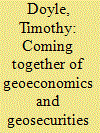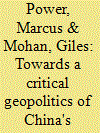| Srl | Item |
| 1 |
ID:
134283


|
|
|
| 2 |
ID:
089282


|
|
|
|
|
| Publication |
2009.
|
| Summary/Abstract |
On January 7, 2009, after an unexpectedly severe disagreement between Russia and Ukraine, ostensibly over natural gas prices, Moscow cut off gas supplies to Ukraine. Then, Ukraine did the same to Europe. European reserves soon dwindled, and with neither Russia nor Ukraine willing to give in, it took intense European pressure to lead both parties to reach a compromise agreement, which they did on January 18. Russia got higher prices for its gas, and Ukraine got a modest price rise in 2009, relative price stability, and favorable terms for gas transit costs.
|
|
|
|
|
|
|
|
|
|
|
|
|
|
|
|
| 3 |
ID:
145427


|
|
|
|
|
| Summary/Abstract |
Due to global climate change, the Arctic is losing its ice cover with two expected economic consequences: new accessible natural resource reserves and opening maritime routes are anticipated to become accessible. As a result, the Arctic is expected to transform into a globally important geoeconomic space. The article approaches the geoeconomic Arctic by asking whether this transformation is plausible and forthcoming. In particular, the article analyzes critically practical challenges for Arctic economic development as well as geopolitical challenges to the region as a favourable investment and operating environment. The article concludes that while the Arctic will develop economically, the pace and scope of developments are likely to remain moderate due to complex challenges, and that the geoeconomic importance of the region may be exaggerated. Furthermore, external geopolitical dynamics can hinder the realization of the geoeconomic potential of the Arctic. Due to various spill-over effects, illustrated by the crisis in Ukraine, the Arctic is not necessarily as stable an investment and operating environment as often assumed.
|
|
|
|
|
|
|
|
|
|
|
|
|
|
|
|
| 4 |
ID:
087853


|
|
|
|
|
| Publication |
2009.
|
| Summary/Abstract |
Alex Callinicos and Justin Rosenberg have both drawn on the concept of uneven and combined development to resolve what they see as deficiencies in international relations theory: in the case of the former, the absence of a non-realist explanation for the persistence of the states system; in the case of the latter, the absence of a sociological dimension to geopolitics. However, Callinicos omits any consideration of the 'combined' aspect of uneven and combined development, while Rosenberg ascribes characteristics of transhistoricity and internationality to uneven and combined development which it does not possess. Against attempts to either restrict or over-extend use of the concept, I will argue that its theoretical usefulness depends on understanding the limits of its spatial and chronological reach. An alternative, if still partial, explanation for the continued existence of the states system will emphasize the continuing indispensability of nationalism as a means of both containing class conflict within capitalist states and mobilizing support for 'national capitals' engaged in geoeconomic and geopolitical competition.
|
|
|
|
|
|
|
|
|
|
|
|
|
|
|
|
| 5 |
ID:
138064


|
|
|
|
|
| Summary/Abstract |
ANSWERS to the following very important questions will clarify Russia's and China's Central Asia policies and their relationship in the region: What are the region's most attractive features? Why does it attract big international players, including Russia and China? What are the Russian and Chinese interests which are intertwined there to create a space of bilateral and multisided cooperation and rivalry? How have Russia and China changed their Central Asia policies since the 1990s? What are their dynamics and basic principles?
|
|
|
|
|
|
|
|
|
|
|
|
|
|
|
|
| 6 |
ID:
099049


|
|
|
|
|
| Publication |
2010.
|
| Summary/Abstract |
China, in its quest for a closer strategic partnership with Africa, has increasingly dynamic economic, political and diplomatic activities on the continent. Chinese leaders and strategists believe that China's historical experience and vision of economic development resonates powerfully with African counterparts and that the long-standing history of friendly political linkages and development co-operation offers a durable foundation for future partnership. Both in China and amongst some Western commentators a form of exceptionalism and generalisation regarding both China and Africa has been emerging. In this article instead we seek to develop theoretical tools for examining China as a geopolitical and geoeconomic actor that is both different and similar to other industrial powers intervening in Africa. This is premised on a political economy approach that ties together material interests with a deconstruction of the discursive or 'extra-economic' ways by which Chinese capitalism internationalises. From there we use this framework to analyse contemporary Chinese engagement in Africa. We examine the changing historical position of Africa within Beijing's foreign policy strategy and China's vision of the evolving international political system, looking in particular at China's bilateral and state-centric approach to working with African 'partners'. Chinese practice is uncomfortable and unfamiliar with the notion of 'development' as an independent policy field of the kind that emerged among Western nations in the course of the 1950s and increasingly China has come to be viewed as a 'rogue creditor' and a threat to the international aid industry. Rather than highlighting one strand of Chinese relations with African states (such as aid or governance) we propose here that it is necessary to critically reflect on the wider geopolitics of China-Africa relations (past and present) in order to understand how China is opening up new 'choices' and altering the playing field for African development for the first time since the neo-liberal turn of the 1980s.
|
|
|
|
|
|
|
|
|
|
|
|
|
|
|
|